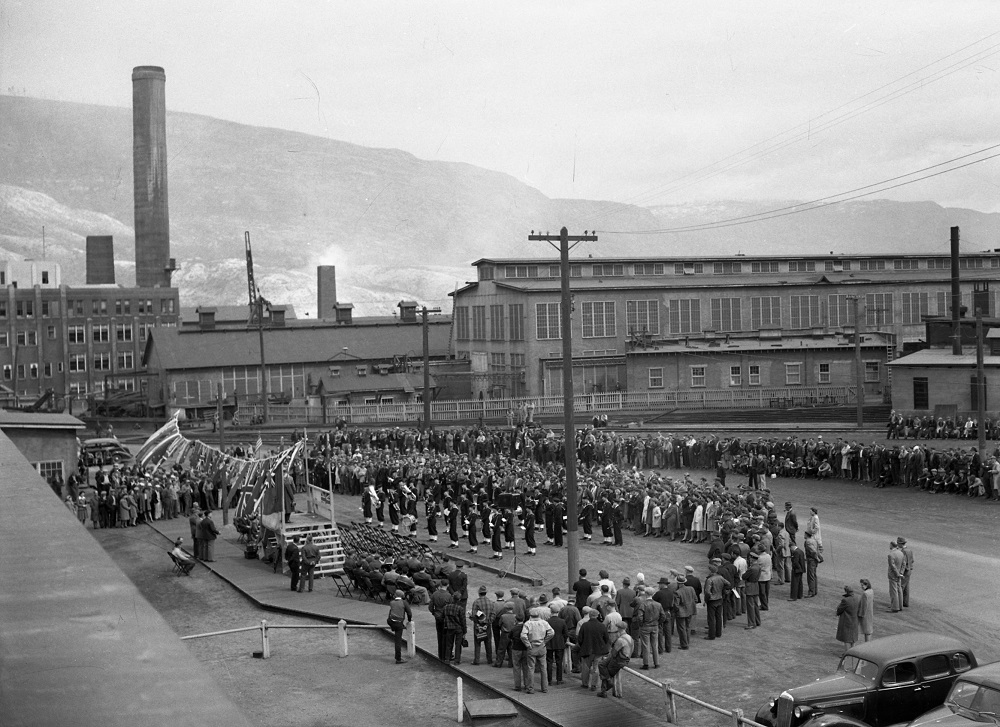Teck On the Home Front: Commodities and Community
Teck Trail Operations is proud to commemorate 125 years of continuous smelting with an eight-part series that explores the company’s significant role in the region and industry, from the gold rush to becoming one of the world’s largest fully integrated zinc and lead smelting and refining complexes. Since 1896, visionary leadership, generations of skilled employees, adaptation, and industry-leading technological advancements in mining and smelting have helped the company achieve long-term success. Please enjoy this series that celebrates our legacy as Champions of Innovation.
Amidst perilous times in the First and Second World Wars, a light of community shone through the darkness as an economic powerhouse lit the way: the Consolidated Mining & Smelting Company (CM&S, now Teck Trail Operations). It invested in supporting local citizens, both those who enlisted and those who kept the town together while war raged across the pond. The company was deeply entwined with war efforts, contributing in many ways, including providing the raw materials for ammunition, military equipment and other wartime necessities.
During World War I, contracts with the British government to supply commodities such as lead, zinc, tungsten, mercury and magnesium at fixed prices drove a healthy business. Following the war, Selwyn Blaylock, a brilliant chemist, ushered Teck through the Great Depression.
In 1934, Blaylock created a research team whose work would result in the production of heavy water, which would eventually become useful to the American government during World War II. By 1942, the company reached an agreement to produce it for them as one of several plants for the Manhattan Project. But the secret plan, known as Project 9, never contributed materials to the Americans’ atomic bombs. The scientific advancements the company researchers, engineers and scientists achieved were significant; the substance had broad applications for both war and nuclear energy, and its development stands as an astounding historical innovation.
The company’s established success in the metal and chemical industry allowed it to maintain steady employment. At the request of the government, the company expanded its fertilizer operation and established ordnance-grade ammonium nitrate plants in Trail in 1941 and Calgary in 1942 for making munitions. These were later converted to fertilizer plants.
Another company undertaking was the Cominco Magazine, which began publishing in 1940 and featured stories on local sports, events and happenings around town. Enlisted employees and their families cherished the magazine, which soon became a cultural pillar. Unlike others of the time, it continued to run for decades after the war, eventually inspiring subsequent publications.
Communicating news from home was important, but the community was also in need of fiscal support. Teck employees formed a patriotic war fund, donating one full day’s salary per month to provide a financial cushion for those abroad. The fund amounted to $100,000 after two years, which was no small feat for the little town. And the company helped ensure a solid foundation in another way; Rob Reilly, past president of Trail’s Royal Canadian Legion Branch 11, recalls how Teck supported veterans and their families.
“The biggest thing the company did during the world wars was allow their employees to sign up for active service while retaining their jobs. The company guaranteed that these boys who served would have a job when they came back; that was really important.”
The stability this provided for young soldiers and their families wove a fabric of economic safety through the community that had lasting effects for decades.
“My own father, in the midst of his electrical apprenticeship, signed up in 1942,” Reilly adds. “And when he got back in ’45 or ’46, he went right back into that apprenticeship. It was really an amazing contribution from the company.”
During wartime, the company’s leaders provided clear direction and demonstrated the ability to redirect in the most difficult of circumstances. Many local citizens appreciated both the support and sense of patriotism the company helped foster. Today, Teck continues to prove a resilient and thriving corporation, mirroring the strength and spirit of the people of BC’s Kootenay region.
___
Teck Trail Operations has helped shape the Kootenay region both economically and culturally for over a century. Stay tuned for the next installment of Champions of Innovation, which will highlight how women significantly contributed to the war effort.


























